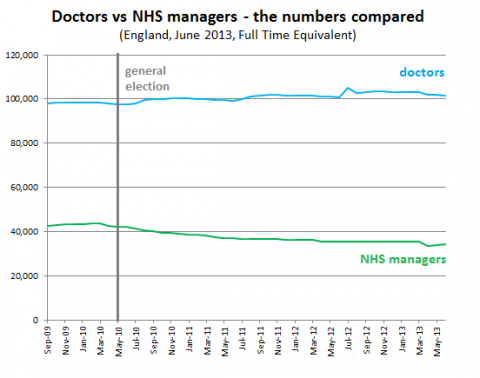Conservative claims on the NHS
This week Jeremy Hunt addressed his party's conference. Announcing a series of new NHS reforms, he listed the Coalition's achievements in this area. As with his Labour counterpart, we've taken a look at the evidence.
More operations, shorter waiting times?
The Health Secretary said that the Coalition could be proud to have done more with less:
"On basically the same budget in real terms, the NHS is doing 800,000 more operations every year than Labour's last year in office".
Certainly, NHS figures do show that there were 827,840 more operations (technically referred to as Finished Consultant Episodes involving a procedure) in 2012/13 compared with 2009/10.
Mr Hunt also claimed that fewer people are facing long waits for an operation:
"In 2010, 18,000 people waited more than a year; now it's less than 400."
While there has been little change in average waiting times (the median wait has remained stubbornly at five weeks), there has been a dramatic fall in the number of people waiting more than a year for an operation. According to the latest statistics in July 2013 there were, as Mr Hunt says, only 371 people waiting longer than this - compared to 18,458 in May 2010.
However, the previous Labour government had already reduced the waiting list from the hundreds of thousands. In August 2007 (the start date of this data set), there were 578,682 people who had been waiting for over a year.
Infection rates halved?
According to Mr Hunt, under the Coalition rates of MRSA (a type of bacterial infection that's resistant to common antibiotics) have halved. Since 2008, the government has required NHS trusts to keep track of the number of patients who develop a case of MRSA while receiving treatment. A high rate of MRSA can be an indication of poor hygiene on a ward, and might therefore provide an early warning sign if a hospital is being mismanaged.
Government figures support Mr Hunt's claim that MRSA infection rates are half what they were before the general election - in 2009/10 there were 1,898 cases of MRSA, while in 2012/13 there were only 924. In addition, there are now 40% fewer cases of Clostridium difficile, an infection of the gut that is most commonly acquired in hospital.
Focus on the frontline?
Mr Hunt also said that as a result of the Coalition's NHS reforms there are now "8000 fewer managers and 4000 more doctors".
This has been the standard Conservative retort in response to Labour's assertion that 5,500 nurses have lost their jobs since the general election. In fact, both parties have the evidence to back up their claims.
According to official data (which dates back to 2009), the NHS is now employing an extra 3,768 doctors, while there are now 8,144 fewer managers.
